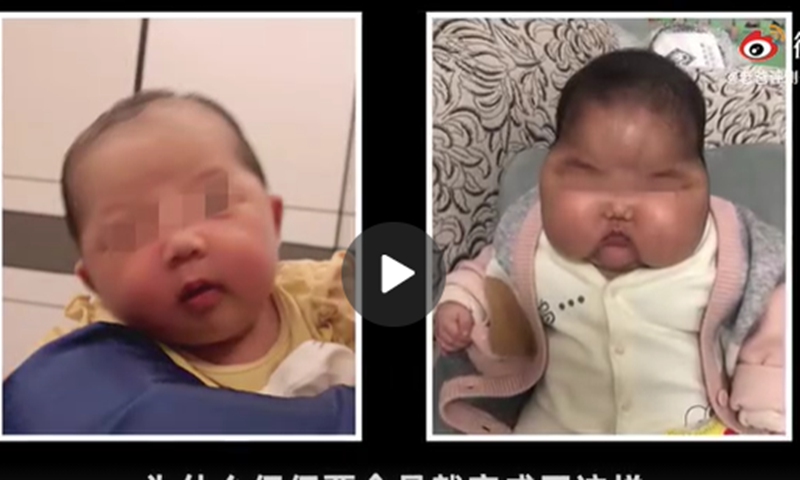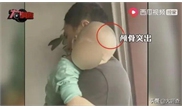Five-month-old 'big head baby' reveals the dilemma in supervising sanitary disinfectant products

Photo: Screenshot of Weibo video
Looking like a real-life Michelin Man, a five-month-old girl became known as a "big head baby" after her parents applied a best-selling anti-bacterial cream to treat skin eczema, which has triggered widespread concern in China.
According to the video blogger team who exposed the incident, this anti-bacterial cream contained excessive amounts of hormones, causing side effects in more than 80 babies, 10 of whom suffered severe symptoms.
The potentially problematic products were sold at very low prices to East China's Jiangsu Province and are now being recalled for testing, a source of Zhangzhou Health Commission told the Global Times.
Previous reports of many megaclysmic babies in China have made countless parents wary of buying baby products, but accidents have continued to occur in recent years.
While local health commissions rushed to screen and halt the sales of the baby anti-bacteria cream, questions over whether there are regulatory ambiguities in the field of pharmaceuticals, sanitary disinfection products, and cosmetics linger on.
Industry insiders have called for detailed regulations and stricter supervision to prevent misleading publicity and misuse of additives by illegal merchants and ensure the safety of infants.
Seeing 'big head baby' again
After using Yifuling, an anti-bacteria cream made by a Zhangzhou-based company in East China's Fujian Province for treatment of skin eczema, a five-month-old baby nicknamed Pomelo in Lianyungang of Jiangsu Province allegedly weighed 22kg, and suffered stunted growth, and a swollen face. Several doctors said the symptoms may have been caused by excessive hormones in the ointment.
A video on Chinese Twitter-like Weibo about Pomelo went viral on January 7. It was made by Daddy Lab, which is an evaluation team that claims to have found that the baby products contain the hormone Clobetasol Propionate, far in excess of standards.
A Daddy Lab employee surnamed Chen told the Global Times on Monday that they have received feedback from many parents since the video surfaced. As of press times, they have counted more than 80 cases of side effects from the same brand of anti-bacterial cream, with more than 10 suffering severe symptoms.
"Clobetasol Propionate is a glucocorticoid drug that should be prescribed by doctor. Long-term use on large areas of skin can lead to Cushing syndrome with side effects such as hair growth, acne, and high blood pressure," a dermatologist surnamed Zhang at Fujian Provincial Hospital told the Global Times.
After stopping the use of the anti-bacteria cream, Pomelo's condition improved significantly and she has recovered.
Fujian Ouai Children's Health Care Products Co., Ltd., the manufacturer of the Yifuling anti-bacterial cream, responded to media queries on January 8 saying there was no problem with their product and the child's parents had hyped the video.
The Global Times found that the company has published an "authoritative" test report on its official WeChat account, which showed that the product did not contain hormones. But on January 8, the company deleted all content from its official website and WeChat account.
The Global Times tried to contact the company through multiple channels, but no response was received.
Currently, Zhangzhou Municipal Health Commission has ordered the company to suspend production, recalling all the involved products and is testing samples from the factory.
A staffer at the Zhangzhou Health Commission told the Global Times that the company's sales lists showed the products were produced in March and September 2020 respectively, with a total of 1,200 bottles in two batches, mainly sold to Suqian and Lianyungang in Jiangsu Province.
Chaotic market
Analysts said the Ouai company might be profiting at the fringes of current laws and regulations, as the specification of Yifuling showed that it belonged to the category of sanitary disinfection products, requiring relatively simple clinical observation, less testing data and shorter approval time compared to topical drugs.
"Some enterprises produced products with attributes of medicines under the banner of disinfection supplies to mislead consumers," an industry insider told the Global Times under condition of anonymity.
The detection of sanitary disinfection products mainly examines its antiseptic effect, which must meet the requirements of Chinese Pharmacopoeia and Regulations on Cosmetics Supervision and Administration and is forbidden to add any prescription substances to these products, including antibiotics, antifungal drugs, and hormones, Wu Bo, secretary general of Fuzhou consumer association told the local media.
Zhang also questioned whether children cosmetics stores, which don't belong to pharmacies, are qualified to sell products that have anti-inflammatory and bacteriological properties.
Pomelo's parents had gone to a maternal and baby products store where they bought the anti-bacterial cream for a review. But the owner insisted there was no quality problem with the product, because the salesperson of the brand told her it sold 200,000 bottles a month nationwide.
The Global Times learned through an undercover investigation that Yifuling was one of the best-selling star products in maternal and baby products stores in Lianyungang, which used to be prominently placed on the shelf. But none of these stores' legal management scope cover disinfection products.
The factory price of Yifuling is 4 yuan ($0.60), merchants purchase price is 28 yuan ($4.3), and the retail sale price ranges from 60 yuan ($9.3) to 80 yuan ($12.4), Xinhua News Agency reported.
"If a baby has eczema or skin allergies, we will recommend anti-bacterial creams to their parents, emphasizing the 'herbal extraction' and 'no preservatives and pigments' of the product, bragging it can quickly reduce inflammation and relieve itching. But in fact we are just reciting the content of the product promotion, and we actually didn't know anything," an employee of a shop for mother and baby products in Lianyungang told the Global Times.
Tighter regulation
Misuse of additives and false advertising by companies and merchants for profit are nothing new in China, as the ambiguity in the laws and regulations create opportunities for illegal businesses, Lu Jiyue, a Beijing-based lawyer told the Global Times.
In 2015, China Consumer Journal sent eight types of popular children's eczema cream to SGS, an authoritative testing institution for testing. Final tests revealed that six of the eight creams contained hormones, and some tested positive for ultra-high levels of Clobetaso Propionate.
In December 2020, the China National Institutes For Food and Drug Control screened eczema products for infants sold online. Four of the seven batches of sanitary disinfection products were found to contain hormones, with a detection rate of 57.1%.
At present, China has explicitly banned false advertising and passing off common chemical products as products for special medical purposes.
"Companies that add prescription drugs to sanitizing disinfection products in the hope that it will act like medicine can be punished for producing counterfeit drugs according to the provisions of Article 98 of the newly revised Drug Administration Law in 2019," Lu said.
At the same time, according to the Regulations on Cosmetics Supervision and Administration, which came into effect on January 1, the advertising terms of daily use chemical industrial products for cleaning and protection purposes shall not express or imply it has medical effects including anti-allergy or anti-bacteria.
As China's standards for the examination and approval of drugs, cosmetics and sanitary products become clearer and detailed, as well as stricter market supervision, the cost of enterprises breaking the law is also increasing, Lu said, expecting the condition Pomelo suffered will be eradicated in the near future.

